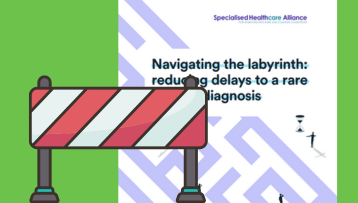The road to understanding how TSC affects you or a loved one following a diagnosis can be confusing, frustrating and very difficult. The TSA is here for everyone at all stages of their TSC journey – including the opening days, weeks and months – when it can be difficult to know what the first steps should be. Although a new diagnosis is different for everyone, there are some common steps that can be useful.
The words ‘Tuberous Sclerosis Complex’ can take time to work through – not only in understanding what TSC is and how it can affect people, but also the wide range of emotions you and those around you will undoubtedly feel. For example, grief is a common reaction, particularly for parents who receive a diagnosis for their child, with some possibly feeling that the lifestyle they had imagined for their son or daughter might now not happen. You may even feel guilt or anger, and wonder ‘Why me?’ or ‘Why my child?’
People new to the TSC community also often have lots of questions, and ‘information overloading’ is a common and understandable reaction to a diagnosis. You may find yourself quickly becoming an expert in epilepsy, autism, kidney problems or any of the other issues that can affect someone living with TSC.
There is never a perfect way to respond to a new diagnosis, but the important thing to remember is that these emotions and responses are normal, and you are not alone. When you feel ready, these steps might come in handy for you and your loved ones:
- Have a chat with the TSA’s support line advisers
Through the TSA Support Line (0808 801 0700 / support@tuberous-sclerosis.org) you can speak to a friendly and empathetic member of the TSA’s support team. Whether you have a specific question or just want a listening ear, we’re hear for you. We will also offer to send a TSA Welcome Pack to you. - Do some research, but only if it is helping you move forward
The TSA’s website and our support line are a wealth of information for you and your loved ones. Getting to know TSC better can help you feel in more control. But, don’t feel burdened to become an expert, as this can feel overwhelming and not be helpful. - Focus on the person, not the condition
As challenging as a diagnosis can be, it is important to not compare the person diagnosed to their peers. Celebrate good days and acknowledge achievements, no matter how small they are. - Take it a day at a time
TSC affects everyone differently, and it can be difficult to know how TSC will impact on a person’s life in the months and years ahead. By looking too far to the future, it can feel like you’re on a never-ending rollercoaster. The most important day for you and your family is today. - Think about an NHS TSC Clinic referral
We suggest that everyone living with TSC gets a referral to an NHS TSC Clinic. The clinicians in TSC Clinics are experts in the condition, and can give medical recommendations in managing and treating the condition, so that the person living with TSC gets the best care possible.
However you begin your TSC journey, do it at your own pace, and do not compare yourself to others. Whatever your initial response to a new TSC diagnosis, remember that you are not powerless –improved information, advances in medical care and ongoing research allows us to continue to look to the future of diagnosis, treatment and management of TSC with hope.
Make a one off or regular donation
£10 Can allow us to send a welcome pack to a family who has just received a life-changing TSC diagnosis, ensuring that they do not go through this time alone.
£25 Can help us develop materials that are included in our support services, flagship events or campaigns.
£50 Can provide laboratory equipment for a day’s research into the causes, symptoms, management or treatment of TSC.
To provide help for today and a cure for tomorrow










































































































